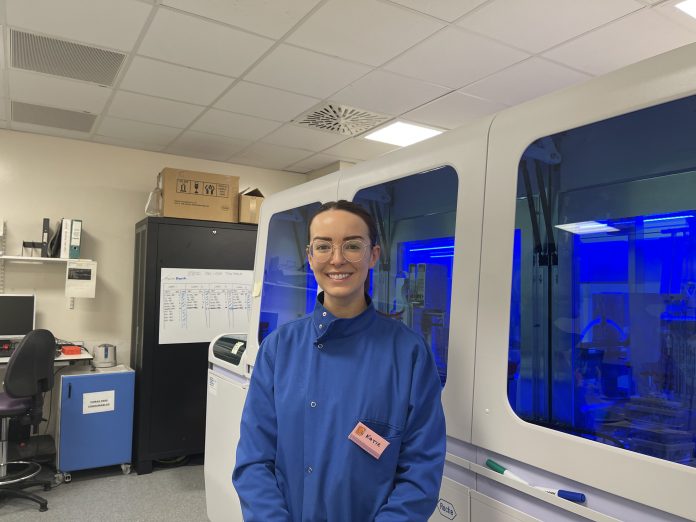During my apprenticeship in biomedical science, I’ve been working in the molecular laboratory where we test for COVID-19. There, I am able to process 192 samples simultaneously.
Before that, I was employed as a medical laboratory assistant (MLA) (NHS Band 3) and I recently obtained a new post as an associate practitioner (Band 4).
Day to day I can be doing anything from booking samples into the laboratory and assigning the tests, running the analysers, or preparing samples to send to reference laboratories.
There are so many jobs you can do and much more to the laboratory than just processing the samples. This includes maintaining laboratory quality, stock management, training, and more. You will always be busy.
My path into biomedical science
After my A-Levels, I went to university to undertake a biomedical science degree.
I ended up completing only one year of the course and had to take a couple of years out. But in the back of my mind knew I wanted to go back and complete my degree.
I had received a place back at university to re-start, however, I was working at the hospital over the summer and that was when the apprenticeship course first started. That year, I managed to get an interview and get the post!
I knew it would be a much better route for me, as I was now 24 and had left home. The apprenticeship route meant having an income and studying part-time.
Science at school
I have always thought of it as my strongest, most important subject throughout school, and this showed in my enthusiasm for it.
In high school, I loved science and ended up taking additional science at GCSE and A-Level.
The teachers really made the lessons enjoyable for me, and my favourite teacher had taken biomedical science at university. I think that was definitely where I was influenced to pursue a career in biomedical science.
Working during a pandemic
It’s been super busy! We have gone from being a relatively small ‘office-hours’ department to the busiest department.
It’s hard to sum up just how much the pandemic has changed our department, but I’d say a lot for the better.
Our working hours changed multiple times to ensure we were providing the best service possible for the patients in the hospital, so it has been tough to keep up with the changes in routine.
We’ve had lots of new staff members join us to keep up with the work and it has been great to meet new people with different experiences.
Quick turnaround
We’ve had lots of new equipment to keep up with demand. Most of it is specifically designed for COVID-19 testing and with the workload and training pressures, it has been eventful, to say the least!
The general pressures from the hospital have put a large amount of pressure on our team. With most of our PCR tests taking six hours to turn around a result, when we have been inundated with samples you can imagine the phone calls we have received.
But even with all of the changes we have had, I think the whole team has a real sense of NHS pride. We have all been proud of our hard work to provide COVID-19 testing to our community.
If you want to get into biomedical science
I would 100 per cent recommend the healthcare science apprenticeship route. Being in the lab surrounded by knowledgeable professionals is invaluable.
If you are going to university full time, ensure your biomedical science course is accredited by the Institute of Biomedical Science (IBMS) and fight for an applied spot where you can get your professional HCPC registration done over one summer. It will make it a bit easier for you after university.
Many biological science degrees are able to adapt and take top-up modules to cover the standards set by the IBMS that will allow you to work as a biomedical scientist.
Making a contribution
It is always great to get into the laboratory, and you will get a real understanding of how everything works.
Working in the hospital helps you realise that the tests we perform are essential for patient diagnosis and treatment.
You appreciate that you contribute to the entire patient pathway to ensure each patient has the best care possible.
Overcoming challenges
It has been difficult having to constantly adapt at work and also trying to keep up with studying.
As with a lot of workplaces, the COVID isolation policies in place have meant we have often been spread a bit thin on the ground.
Trying to keep up with everything has been challenging and my mantra has been to just keep on going; keep on working and keep on supporting others.
It’s been a rough ride for everyone this past year and it has motivated me to keep looking out for others and remembering how being positive and working hard impacts positively on myself and them. A happy team is a productive team!
Looking ahead
It is a job that requires hard work and continual learning but is rewarding in so many ways.
If COVID-19 has taught us anything, it is that you really don’t know what virus is coming around the corner next and how essential your skills as a biomedical scientist are.
